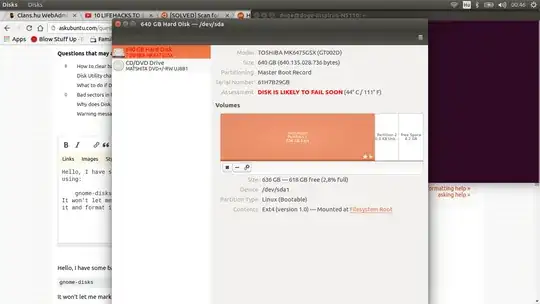I have some bad sectors on my drive, but when I open disk utility using:
gnome-disks
It won't let me mark them, or do anything with the driver except benchmark it and format it!
 Please help, my disk is most likely to fail on me right now!
Please help, my disk is most likely to fail on me right now!
I have some bad sectors on my drive, but when I open disk utility using:
gnome-disks
It won't let me mark them, or do anything with the driver except benchmark it and format it!
 Please help, my disk is most likely to fail on me right now!
Please help, my disk is most likely to fail on me right now!
Install gsmartcontrol and smartmontools, using Synaptic. Then, open gsmartcontrol from the dash, and run the smart extended disk test. This will scan for bad blocks.
You could also use the "badblocks" command in terminal, but be careful, if you give it the wrong parameters, it could wipe out your data. See "man badblocks" for more info.
And yes, I'll echo the previous advice... backup your data... and be prepared to replace the hard disk... Toshiba hard disk drives aren't great.
Update #1:
The correct way to bad block a hard drive...
Note: do NOT abort a bad block scan!
Note: do NOT bad block a SSD
Note: backup your important files FIRST!
Note: this will take many hours
Note: you may have a pending HDD failure
Boot to a Ubuntu Live DVD/USB in “Try Ubuntu” mode.
In terminal...
sudo fdisk -l # identify all "Linux Filesystem" partitions
sudo e2fsck -fcky /dev/sdXX # read-only test
or
sudo e2fsck -fccky /dev/sdXX # non-destructive read/write test (recommended)
The -k is important, because it saves the previous bad block table, and adds any new bad blocks to that table. Without -k, you loose all of the prior bad block information.
The -fccky parameter...
-f Force checking even if the file system seems clean.
-c This option causes e2fsck to use badblocks(8) program to do
a read-only scan of the device in order to find any bad blocks.
If any bad blocks are found, they are added to the bad block
inode to prevent them from being allocated to a file or direc‐
tory. If this option is specified twice, then the bad block scan
will be done using a non-destructive read-write test.
-k When combined with the -c option, any existing bad blocks in the
bad blocks list are preserved, and any new bad blocks found by
running badblocks(8) will be added to the existing bad blocks
list.
-y Assume an answer of `yes' to all questions; allows e2fsck to be
used non-interactively. This option may not be specified at the
same time as the -n or -p options.